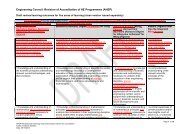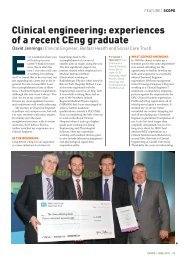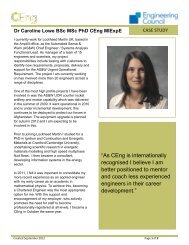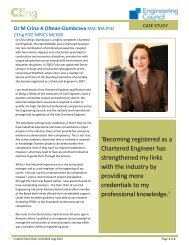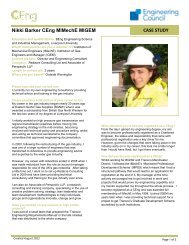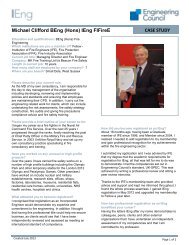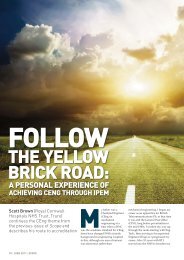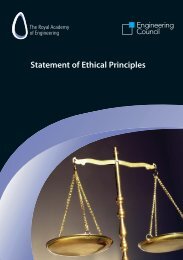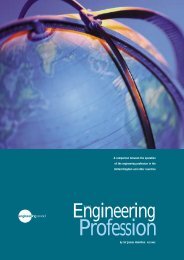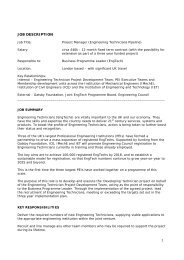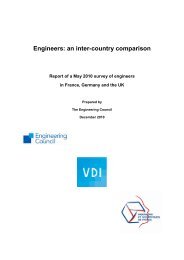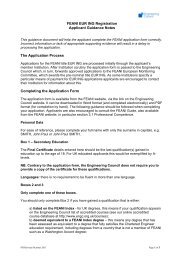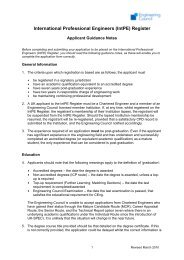An Engine for Change - A Chronicle of the Engineering Council
An Engine for Change - A Chronicle of the Engineering Council
An Engine for Change - A Chronicle of the Engineering Council
Create successful ePaper yourself
Turn your PDF publications into a flip-book with our unique Google optimized e-Paper software.
58A CHRONICLE OF THE ENGINEERING COUNCILDespite all this <strong>the</strong> Chairman and <strong>the</strong> Director General patiently went over <strong>the</strong> same issuestime after time; by <strong>the</strong> end <strong>of</strong> Sir William’s three-year term it seemed that relations between<strong>the</strong> EngC and <strong>the</strong> Institutions had improved and worked reasonably well. As Sir Williamstated in <strong>the</strong> <strong>An</strong>nual report <strong>for</strong> 1989, “UK <strong>Engine</strong>ering is an important element in our nationallife and we want to help <strong>the</strong> pr<strong>of</strong>ession and industry as much as we can”.The first occasion Sir William selected to comment publicly on an engineering issue was on<strong>the</strong> publication <strong>of</strong> an excellent report from <strong>the</strong> Advisory <strong>Council</strong> <strong>for</strong> Applied Research andDevelopment (ACARD) on <strong>the</strong> significance <strong>of</strong> electro-optics. As this referred to many issues<strong>of</strong> national importance he organised a press conference and commented on <strong>the</strong> report. Butinstead <strong>of</strong> appreciation <strong>for</strong> a prompt engineering response, he received criticism from severalInstitutions and even from some EngC <strong>Council</strong> members. The opponents on <strong>Council</strong> saidplainly that <strong>the</strong> EngC had no mandate or duty to make pronouncements on behalf <strong>of</strong> <strong>the</strong>pr<strong>of</strong>ession. The Institutions stated that it was <strong>the</strong>ir job to comment but, in fact, none <strong>of</strong> <strong>the</strong>mcould do so without consulting <strong>the</strong>ir members and none had a rapid reaction mechanism <strong>for</strong>this. At a special brainstorming meeting <strong>of</strong> <strong>Council</strong> held at <strong>the</strong> RAC Club this issue wasthrashed out and <strong>the</strong> result was that <strong>the</strong> majority felt that <strong>the</strong> EngC should not make publicpronouncements on specific issues. Sir William believed this was a serious lost opportunityand if <strong>the</strong> EngC, covering 48 Institutions, could not speak <strong>for</strong> <strong>the</strong> pr<strong>of</strong>ession, he wasconvinced that one <strong>of</strong> <strong>the</strong> main reasons <strong>for</strong> its existence was also lost. Never<strong>the</strong>less, fromtime to time, as Chairman <strong>of</strong> <strong>the</strong> EngC and despite lacking support from <strong>the</strong> <strong>Council</strong>, he didspeak out on national issues, finding both Government and <strong>the</strong> media willing to listen andnote his views.At <strong>the</strong> instigation <strong>of</strong> Sir William Barlow in 1989, His Royal Highness The Duke <strong>of</strong> Kent,KG, GCMG, GCVO, ADC, was invited to become <strong>the</strong> EngC’s first President, <strong>the</strong>rebypublicly raising <strong>the</strong> pr<strong>of</strong>ile <strong>of</strong> <strong>the</strong> engineering pr<strong>of</strong>ession. As a member <strong>of</strong> <strong>the</strong> Royal Familywith a demonstrable interest in engineering and manufacture, The Duke <strong>of</strong> Kent was a logicalchoice; at that time he was Vice-Chairman <strong>of</strong> <strong>the</strong> British Overseas Trade Board and a nonexecutiveDirector <strong>of</strong> both BICC and Vickers plc, besides holding o<strong>the</strong>r posts in <strong>the</strong> fields <strong>of</strong>science and technology. He was, <strong>for</strong> example, Patron <strong>of</strong> <strong>the</strong> British Computer Society, a pastPresident <strong>of</strong> <strong>the</strong> British Association <strong>for</strong> <strong>the</strong> Advancement <strong>of</strong> Science and a past President <strong>of</strong><strong>the</strong> <strong>for</strong>mer Institution <strong>of</strong> Electronic and Radio <strong>Engine</strong>ers. Although at first hesitant aboutaccepting <strong>the</strong> position, His Royal Highness subsequently demonstrated his support <strong>for</strong> <strong>the</strong>work <strong>of</strong> <strong>the</strong> EngC by attending many functions, meeting committee members and visiting <strong>the</strong>staff at <strong>the</strong> Maltravers Street <strong>of</strong>fices.1989 marked a clear change in emphasis, if not in direction, <strong>for</strong> many <strong>of</strong> <strong>the</strong> activities <strong>of</strong> <strong>the</strong>EngC, its committees, panels and working groups. The influence <strong>of</strong> a new Chairman and anew Director General was obviously making an impact. The Government introduced novelideas into <strong>the</strong> nation’s education system and considerations <strong>of</strong> “Europe” began to influence<strong>the</strong> thinking <strong>of</strong> policy makers. Whilst some EngC activities continued seamlessly during thisperiod, o<strong>the</strong>rs were phased out and new initiatives were introduced.Interfacing with <strong>the</strong> InstitutionsNominated and Authorised BodiesOne <strong>of</strong> <strong>the</strong> long-standing aims <strong>of</strong> <strong>the</strong> EngC had been to reduce, by amalgamation, <strong>the</strong>number<strong>of</strong> Institutions, some <strong>of</strong> which had very small membership numbers. Generally,© <strong>Engine</strong>ering <strong>Council</strong> UK 2004



